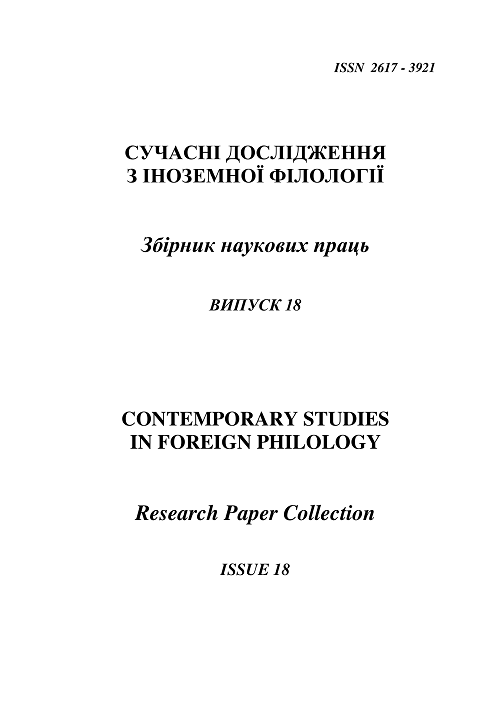Wortbildende und semantische Besonderheiten der deutschen Adjektive mit Halbpräfixen
DOI:
https://doi.org/10.24144/2617-3921.2020.18.72-80Анотація
The formation of derivatives with the help of semi-affixes is one of the productive ways of German word-formation. Word-formation with semi-affixes is one of the most controversial issues in German linguistics. Nouns and adjectives are formed with the help of semi-affixes. Semi-affixes present a special type of affixes formed from certain words that have lost their independent lexical meaning. They are also referred to as "affixoids", a synonymous term. Accordingly, semi-prefixes or prefixoids and semi-suffixes or suffixoids are further distinguished. Therefore, derivatives with semi-affixes are mainly regarded as derived words, not complex. However, some linguists refer to these formations as complex words. Semi-prefixes are formed from independent words that may become prefixes. By joining noun or adjective bases, they partially lose their semantics, while acquiring a generalizing meaning. Most of the studied adjectives are creative and expressive, with transferred meanings. A number of lexical units have an emotionally reinforcing meaning, so their use is marked by certain features. In most cases, the positive meanings of adjectives are amplified. There are cases when semi-prefixes have negative semantics, which occurs mainly in colloquial language. Most adjectives are used only in colloquial language. Adjectives of literary German, in addition to the main meaning, in spoken German acquire transferred meanings.
Keywords: vocabulary, derivatives, complex words, hybrid formations, genetic analyses, colloquial speech, emotional meaning.
Посилання
Bußmann H. Lexikon der Sprachwissenschaft. Stuttgart: Alfred Kröner Verlag, 2002. 783 S. 2. Duden. Deutsches Universalwörterbuch. Mannheim: Dudenverlag, 2015. 2112 S.
Duden. Grammatik der deutschen Gegenwartsprache. Mannheim, Wien, Zürich : Dudenverlag, 1995. – 864 S.
Duden. Deutsche Grammatik. Mannheim, Wien, Zürich : Dudenverlag, 1997.– 409 S.
Hinka B. I. Lexikologie der deutschen Sprache: Vorlesungen und Seminare. Навчальний посібник для студентів-германістів. Тернопіль: Редакційно-видавничий відділ Тернопільського національного педагогічного університету імені В.Гнатюка, 2005. 220 с.
Ladtschenko M. M. Halbsuffixe der Substantive zum Ausdruck der negativen Eigenschaften der Menschen in der deutschen Umgangssprache. IV Таврійські філологічні читання: Матеріали Всеукраїнської науково-практичної конференції: м. Херсон, 28-29 вересня 2018 р. Херсон: Херсонський державний університет, 2018. С. 99 -103.
Stepanova M. D., Černyševa I.I. Lexikologie der deutschen Gegenwartssprache. M.: Hochschule, 1986. 247 S.
Wahrig G. Grammatik der deutschen Sprache, Gütersloh / München : Bertelsmann Lexikon Verlag, 1999. – 702 S.
Девкин В. Д. Немецко–русский словарь разговорной лексики. М.: Русский язык, 1994. 768 с.
Кульчицький В. Класифікація похідних слів сучасної німецької мови на основі семантичних категорій. Гуманітарна освіта в технічних вищих навчальних закладах. 2017. № 36. C. 24-29.
Ладченко М. М. Словотвірні особливості іменників у німецькій розмовній мові. Modern philology: relevant issues and prospects of research: Conference proceedings (October 20-21, 2017). Lublin: Izdevnieciba «Baltija Publishing», 2017. С. 105 – 109.
Ладченко М. М. До проблеми збагачення словникового складу німецької розмовної мови. Таврійські філологічні наукові читання: матеріали міжнародної наук.-практ. Конф. (Київ, 27-28 січня 2017 р.) Київ: Таврійський національний університет імені В. І. Вернадського, 2017. С. 99 – 103.
Мюллер В. Великий німецько-український словник. К.: Чумацький шлях, 2005. 792 с.
Перестюк Т. Аугментативні похідні із зоосемічним компонентом у німецькій мові. URL: https:// old.lingua.lnu.edu.ua/ Foreign_Philology _120/articles/11% 20 perestiuk%20vypravleno%20formatted.pdf (дата звернення 18. 06. 2020).
Ходаковська Н.Г. Семантичний та прагматичний аспекти стилістично маркованих похідних іменників сучасної німецької мови. URL: https:// mydisser.com/ua/catalog /view /312/771/22044.html (дата звернення 15. 10. 2019).
##submission.downloads##
Номер
Розділ
Ліцензія
Автори, які публікуються у цьому журналі, погоджуються з наступними умовами:
- Автори залишають за собою право на авторство своєї роботи та передають журналу право першої публікації цієї роботи на умовах ліцензії Creative Commons Attribution License, котра дозволяє іншим особам вільно розповсюджувати опубліковану роботу з обов'язковим посиланням на авторів оригінальної роботи та першу публікацію роботи у цьому журналі.
- Автори мають право укладати самостійні додаткові угоди щодо неексклюзивного розповсюдження роботи у тому вигляді, в якому вона була опублікована цим журналом (наприклад, розміщувати роботу в електронному сховищі установи або публікувати у складі монографії), за умови збереження посилання на першу публікацію роботи у цьому журналі.
- Політика журналу дозволяє і заохочує розміщення авторами в мережі Інтернет (наприклад, у сховищах установ або на особистих веб-сайтах) рукопису роботи, як до подання цього рукопису до редакції, так і під час його редакційного опрацювання, оскільки це сприяє виникненню продуктивної наукової дискусії та позитивно позначається на оперативності та динаміці цитування опублікованої роботи (див. The Effect of Open Access).

